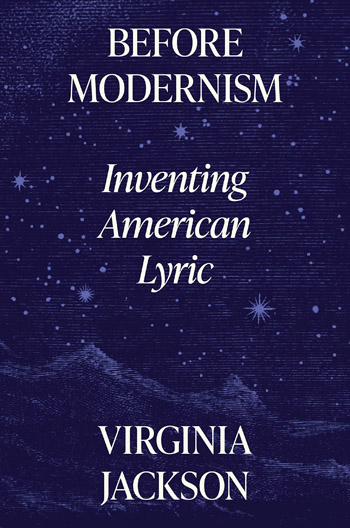|
BEFORE MODERNISM:
Inventing American Lyric
Virginia Jackson
ISBN 978-0-691-23280-5 reviewed by Alan Dent
At the core of this study is an interesting thesis: that 19th
century American poetics turned a poetry of genres into a poetry of
persons, the latter being, in essence, what “lyric” poetry is deemed
to be. Jackson has written the definition of lyric poetry for the
Princeton Encyclopaedia of Poetry and Poetics:
In Western poetics, almost all poetry is now characterised as
lyric…..A modern invention,…lyric has profoundly influenced how we
understand all poetic genres.
The “almost” admits many exceptions and it might be worth asking who
the “we” refers to. Do poets care whether their work is thought of
as “lyric”? How would the poetry of Fred Voss fall into the
category? Does it express “personal feeling”? In a way, but much
more. The categories are of greater significance to academics than
to poets themselves. As is true of all art forms. Art lives by
subversion, definitions which help academics, hinder artists
(political definitions are the death of art).
Jackson brings welcome attention to important but neglected figures,
Phyllis Wheatley, Ann Plato and Frances Ellen Watkins for example.
The latter was born in 1825, published her first book of poetry aged
twenty, was a vigorous abolitionist, public speaker, and in 1892
published Lola Leroy, a novel which pulls the rug from
beneath white supremacism. That she is less well-known than many
white, male writers of no greater distinction is no surprise. Her
achievement, given the forces working against her is remarkable and
it’s heartening that academics like Jackson are reviving the
reputations of such writers. Jackson isn’t doing this simply to set
right a sin of neglect, but to elaborate her hypothesis that
American lyric poetry owes a debt, and perhaps its major debt, to
the work of non-white writers. Literature, like everything else in
American life, she is arguing, is marinated in white supremacism.
Naturally, non-white writers who broke the ground which led to
Whitman and the rest of the lauded white men, have been sidelined
and in the process, a false view of the development of American
poetry installed. American poetry began, she writes, “as something
it no longer is: popular literature addressed to print publics that
crossed genres and media and nations and genders and races and
educations and classes.” It’s perhaps a pity she employs “races” as,
Richard Lewontin’s critics notwithstanding, they don’t exist. We
have the word “race” like we have the word “unicorn” but neither
have any reality. That aside, the change from stress on the genre of
poem to category of person is an interesting idea.. A multiplicity
of forms became essentially single: the lyric. What mattered was the
identity behind it.
The book is an exploration of this notion through the literature of
the nineteenth century. It’s full of fascinating detail and
Jackson’s research is impeccable. What the book doesn’t do, however,
is respond critically to the work it considers. There’s discussion,
for example, of Little Eva’s story from Uncle Tom’s Cabin and the
work engendered by it. The novel, as Flaubert pointed out, may have
some value as a tract (though even that is dubious), but is
artistically weak because of its sentimentality. Jackson isn’t
concerned, in this work, to submit literature to close critical
scrutiny; her purpose is to marshal the evidence which sustains her
hypothesis. That’s reasonable, but the issues of the quality of
writing isn’t peripheral.
One of the best examples of writing in this book comes from James
Baldwin’s famous essay about Stowe’s novel:
“ Sentimentality, the ostentatious parading of excessive and
spurious emotion, is the mark of dishonesty, the inability to feel;
the wet eyes of the sentimentalist betray his aversion to
experience, his fear of life, his arid heart; and is always,
therefore, the signal of secret and violent inhumanity, the mask of
cruelty.”
Kafka upbraided Dickens for the failing, writing that “there is a
heartlessness behind his sentimentally overflowing style”, which
doesn’t stop him being taught as an exemplar of great writing.
Jackson is no James Baldwin. Academics can’t be expected to be great
prose stylists. No one expects a study like this to rise to the
level of George Orwell. Yet Jackson’s style at points becomes
somewhat defeating. Of course, there is a requirement for a certain
degree of jargon and impenetrability for reasons of academic
careerism; but the thesis is straightforward enough, the evidence
available. What’s wrong with making expression as clear as possible?
She also intervenes at several points to explain what she’s doing
which begins to feel like a slight lack of confidence in her
project.
She makes reference to Adorno, Marx, Hegel, Jonathan Culler. The
latter is famous for his structuralist approach to literature, an
enterprise which has produced mountains of unreadable tosh
purporting to be akin to science. Literary criticism isn’t a science
and it’s foolish to try to imitate the kind of procedures physicists
or chemists employ. Literature is a form of human behaviour, which
simply isn’t (if only for ethical reasons, but in fact also because
of the limits of our cognition) available for study in the way
physical forces or chemical reactions are. We should be glad of
that. We aren’t scientists, we’re just people thinking about books.
What’s wrong with that?
.
|
